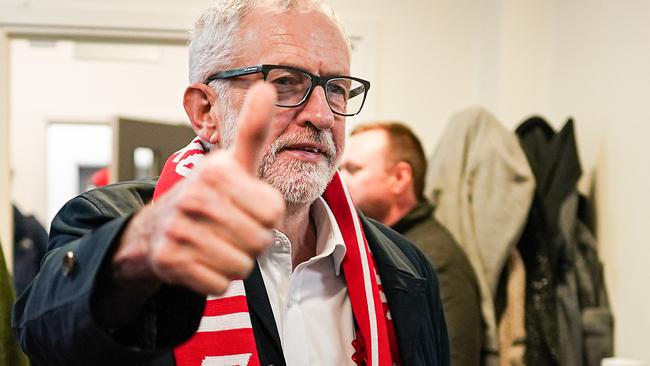UK election 2019: What Britons could wake up to on Friday
How will the UK election result change the make-up of the Commons, the future of Brexit and the ability to govern?

The campaign is almost over. After five weeks of pledges, slogans, accusations and the occasional gaffe it is now up to voters to decide who, if anyone, will be able to form a government on Friday morning.
But what are the outcomes that might unfold when the result is declared? And how could it change not only the make-up of the House of Commons but the future of Brexit and the ability to govern the country?
Here we take a look at the scenarios.
Healthy Conservative majority

Boris Johnson would be – for the time being at least – the master of all he surveyed at Westminster. The re-elected prime minister would easily be able to pass the EU Withdrawal Agreement and fulfil his election pledge to get Brexit done by the end of next month.
With such a sizeable lead and many new Tory MPs owing their loyalty to him, Mr Johnson would also be free to push through whatever kind of future relationship he negotiated with the EU.
Some think this would be a bare bones trade agreement that would mean the UK pivoting its economy towards America and Asia, with significant disruption to industries that rely on close trading links with Europe.
However, others suspect that Mr Johnson, freed from electoral constraints, would opt for a much closer trading relationship with the EU, not that dissimilar from the one envisaged by his predecessor, Theresa May. With a large majority Mr Johnson would have the power to choose.
A larger majority might also embolden him to embark on a more radical policy agenda than that set out in the Conservative manifesto. He could attempt to tackle the crisis in social care and pursue a constitutional reform program to restrict parliament’s power over the executive. Such proposals, which would be controversial, would be possible only if he has enough “spare” MPs to ignore opposition from some of his backbenchers.
READ MORE: Boris’ message – vote for me, actually | Labour victory now ‘major risk’ | Fraction of Britons to decide poll | Johnson becomes demolition man | Troy Bramston writes: Heaven help UK if Corbyn is PM
A majority of less than 20

This would still be a win for Mr Johnson and would allow him to deliver Brexit by January 31. But after that his room for manoeuvre would be constrained.
While many pro-European Tories stood down at this election, most hardcore Conservative Brexiteers are expected to return to Westminster. They would want to hold Mr Johnson’s feet to the fire over his hard line Brexit pledges. They would push back at any attempt to diminish their vision of Britain after Brexit and could prove to be as much a thorn in Mr Johnson’s side as they were to Mrs May’s.
If Mr Johnson has a majority of less than ten then the next stage of the Brexit process could prove just as tricky as the first. The prime minister would be aware that his narrow victory was based on winning seats in Labour heartlands based on Brexit alone. New Tory MPs in those seats will be even more aware of that. Mr Johnson would therefore be nervous of the effects of any economic Brexit disruption that could be laid at the Conservatives’ door. Political life for the government would be far from straightforward.
The largest party but just short of a majority

Like Mrs May in 2017, it is possible that the Conservatives could win the most seats in the House of Commons but still not have an overall majority.
Two years ago Mrs May had a ready and willing ally in the form of the Democratic Unionist Party (DUP), which gave her the votes needed to form a government.
This time it is not so simple. The DUP is vehemently opposed to Mr Johnson’s Brexit deal and would demand that he drop it as the price of their support. But without the withdrawal agreement Brexit cannot be delivered, breaking the prime minister’s central election pledge. The EU will not renegotiate for a third time to help Mr Johnson out.
If the DUP won’t support him Mr Johnson could try turning to the Liberal Democrats, with whom the Tories formed the last coalition. But Jo Swinson has stated that she would not countenance a pact that would keep Mr Johnson in Downing Street, as have the Scottish National Party (SNP). They may change their minds but it seems very unlikely.
Overall it is hard to see any viable path for Mr Johnson to remain in Downing Street even if the Tories are the largest party in a hung parliament.
Divided parliament and a rainbow alliance

If neither the Conservatives nor Labour are close to an overall majority then we will be in for days – if not weeks – of uncertainty over the make-up of the government. As the prime minister, Mr Johnson would remain in Downing Street while talks between parties started to try to form a government that could command the confidence of the Commons. This need not be a formal coalition as in 2010. It would merely need to be an agreement whereby either party was guaranteed votes on its budget, Queen’s speech and issues of confidence.
The SNP, which is likely to win more than 30 seats, would be critical. Nicola Sturgeon, its leader, has categorically ruled out propping up a Conservative government but would be prepared to support a Labour government without entering into a full coalition.
However, the price would be steep: Mr Corbyn would have to agree to give the Scottish parliament the power to hold a second independence referendum.
Mr Corbyn has said this is not an early priority for him, but if it were a choice between that or not being able to form a government most people expect him to try to compromise with Ms Sturgeon with an independence poll sooner rather than later – but probably not until Brexit had been resolved.
The Liberal Democrats might also be prepared to back Mr Corbyn, at least in the short term, in order to get a second EU referendum, but the Labour leader would probably have to drop his insistence on renegotiating the existing withdrawal agreement first.
One option that some people have talked about is the possibility of a government of national unity, made up entirely of parties opposed to Brexit.
This would be an administration, possibly led by Mr Corbyn, that would be time-limited in scope and designed to keep the country ticking over while a second EU referendum was legislated for and took place.
A Labour majority

Most pollsters agree that there is only a remote chance of Labour winning an overall majority given the strength of the SNP in Scotland and its own weakness in its northern heartland.
However, should an electoral earthquake take place Britain would enter into a very different political phase.
It would most likely result in the country remaining in the EU while embarking on one of the most radical reforms of the role of the state since the Second World War.
The Times



To join the conversation, please log in. Don't have an account? Register
Join the conversation, you are commenting as Logout